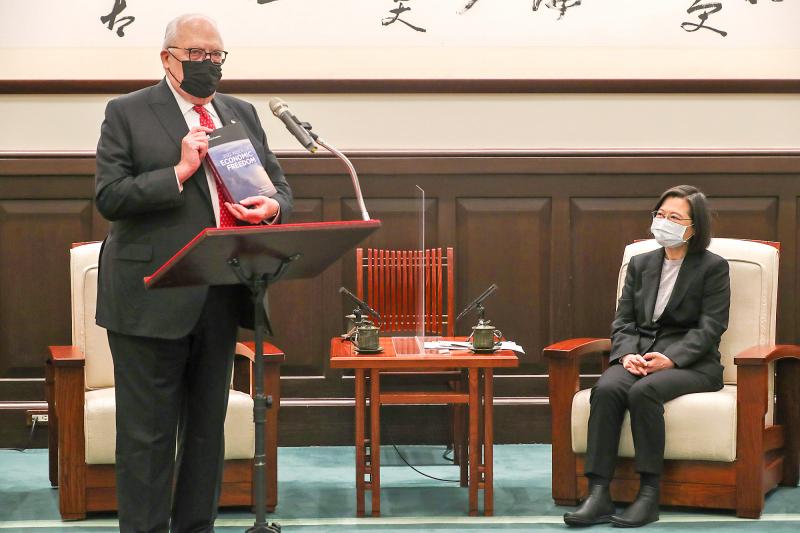Taiwan ranked sixth in this year’s Index of Economic Freedom, the same as last year, but its overall score gained 1.5 points to 80.1, joining the “Free” index category for the first time, thanks to improvements in judicial effectiveness and labor freedom, the Heritage Foundation said in an annual survey released yesterday.
The US think tank grades 12 indicators in 184 economies — from property rights to financial freedom — grouped into four categories: rule of law; government integrity; judicial effectiveness; and regulatory efficiency and open market.
“Taiwan is one of the few countries in the world to have experienced continuous economic growth during the past five years. Economic freedom has increased significantly during that period as well,” the Washington-based foundation said.

Photo: CNA
Taiwan ranked third among 39 nations in the Asia-Pacific region and its overall score was higher than the regional and global averages, the foundation said.
By comparison, South Korea was ranked 19th, Japan 35th and China 158th.
With strong scores across the board inflated by improved judicial effectiveness and labor freedom, Taiwan recorded a 3.6 point gain in economic freedom since 2017, it said.
The National Development Council said the government’s efforts to pursue economic freedom had paid off, adding that Taiwan now lags behind Luxembourg and New Zealand by just 0.5 points. Singapore leads the survey, followed by Switzerland and Ireland.
Taiwan’s judicial effectiveness scored 94.2, an increase of 21.3 points from a year earlier, the council said, adding that the nation gained 10 points in investment freedom to 70 and added 8.3 points to labor freedom at 68.7.
Taiwan’s currency freedom picked up 1.8 points to 86.1, but it lost points in business freedom, property rights, government integrity, government spending and fiscal health, the survey showed.
Additional improvements in business freedom and financial freedom would propel Taiwan’s economic freedom even higher, the foundation said.
Taiwan put up a flat showing in trade freedom and financial freedom from the previous year, it said.
Taiwan has six preferential trade agreements in force with the trade-weighted average tariff rate at 2 percent and 391 non-tariff measures in effect. Some agricultural imports face extra barriers, the survey found.
As of Dec. 1 last year, Taiwan had reported 848 deaths attributable to COVID-19 and the government’s response to the pandemic ranked 94th among nations in terms of its stringency, it said.
President Tsai Ing-wen (蔡英文) yesterday received representatives from the Heritage Foundation, including founder Edwin Feulner Jr and research fellow Anthony Kim, at the Presidential Office in Taipei.
Tsai outlined the government’s efforts and achievements in creating a more open economy and liberalized trade, and said she expects a closer Taiwan-US relationship in light of upcoming free-trade and digital economy talks between Taipei and Washington.
Feulner said that Taiwan is an important ally and a cornerstone of the US’ Indo-Pacific strategy.

AIR SUPPORT: The Ministry of National Defense thanked the US for the delivery, adding that it was an indicator of the White House’s commitment to the Taiwan Relations Act Deputy Minister of National Defense Po Horng-huei (柏鴻輝) and Representative to the US Alexander Yui on Friday attended a delivery ceremony for the first of Taiwan’s long-awaited 66 F-16C/D Block 70 jets at a Lockheed Martin Corp factory in Greenville, South Carolina. “We are so proud to be the global home of the F-16 and to support Taiwan’s air defense capabilities,” US Representative William Timmons wrote on X, alongside a photograph of Taiwanese and US officials at the event. The F-16C/D Block 70 jets Taiwan ordered have the same capabilities as aircraft that had been upgraded to F-16Vs. The batch of Lockheed Martin

GRIDLOCK: The National Fire Agency’s Special Search and Rescue team is on standby to travel to the countries to help out with the rescue effort A powerful earthquake rocked Myanmar and neighboring Thailand yesterday, killing at least three people in Bangkok and burying dozens when a high-rise building under construction collapsed. Footage shared on social media from Myanmar’s second-largest city showed widespread destruction, raising fears that many were trapped under the rubble or killed. The magnitude 7.7 earthquake, with an epicenter near Mandalay in Myanmar, struck at midday and was followed by a strong magnitude 6.4 aftershock. The extent of death, injury and destruction — especially in Myanmar, which is embroiled in a civil war and where information is tightly controlled at the best of times —

Taiwan was ranked the fourth-safest country in the world with a score of 82.9, trailing only Andorra, the United Arab Emirates and Qatar in Numbeo’s Safety Index by Country report. Taiwan’s score improved by 0.1 points compared with last year’s mid-year report, which had Taiwan fourth with a score of 82.8. However, both scores were lower than in last year’s first review, when Taiwan scored 83.3, and are a long way from when Taiwan was named the second-safest country in the world in 2021, scoring 84.8. Taiwan ranked higher than Singapore in ninth with a score of 77.4 and Japan in 10th with

SECURITY RISK: If there is a conflict between China and Taiwan, ‘there would likely be significant consequences to global economic and security interests,’ it said China remains the top military and cyber threat to the US and continues to make progress on capabilities to seize Taiwan, a report by US intelligence agencies said on Tuesday. The report provides an overview of the “collective insights” of top US intelligence agencies about the security threats to the US posed by foreign nations and criminal organizations. In its Annual Threat Assessment, the agencies divided threats facing the US into two broad categories, “nonstate transnational criminals and terrorists” and “major state actors,” with China, Russia, Iran and North Korea named. Of those countries, “China presents the most comprehensive and robust military threat